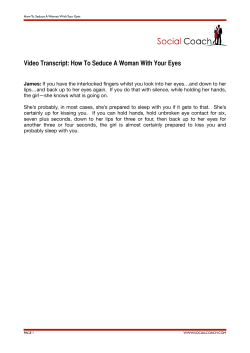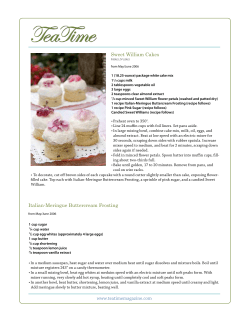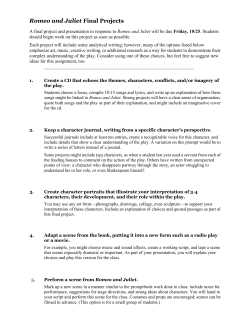
Exploring Beats, Objectives, Tactics and Obstacles __________________________________________________________________
Exploring Beats, Objectives, Tactics and Obstacles __________________________________________________________________ What are Objectives? Objectives are used to break down the psychology of a character. By understanding the character’s psychology, we can make interesting decisions about how to play a character and have active things to play (the act part of acting). An objective is a strong emotional want or need that one’s character has for themselves or from another character in a play. Objectives help in the process of: 1) Creating drama, 2) Causing action, 3) Creating conflict and 4) Giving life to a character. Objectives may come in three different types: 1) Beat objective- (your objective for that smaller moment), 2) Scene Objective- (Your objective for the scene) and 3) Meta-objective- (Your objective for the entire play). Knowing the character’s objectives is the responsibility of the actor. The director will assist when needed, or may change or strengthen an objective, but will rarely tell an actor what their objective is. The Four Elements of Every Objective: * Always start with the “I want to” * A strong, actable verb * To whom the want is directed (your scene partner) * A tactic (a strategy used to achieve your objective), usually formed as a adverb (a word ending in “ly”) * The desired response sought from that character (usually formed with so that) Good Examples of Objectives: I want to humiliate my wife brutally so that she breaks down and cries. I want to ignite the crowd patriotically so that they descend into a riot. I want to seduce Rosalind passionately so that she kisses me. Four Rules about Objectives: * Must be directed towards another character rather than oneself * Phrased as simply and directly as possible * Avoid weak or negative wants. It is difficult to play a negative want or need. Try and turn your active verb into a positive. (Rather than “I want to withdraw from reality shyly” try I want to defend my fantasy factually”) Beats: A beat is a psychological unit where one character tries to achieve their objective. If they achieve their objective, or give up on trying to achieve their objective, there is usually a change in what they want. This change denotes a beat change. When an objective changes, a beat changes. One beat links to the next beat which links to the next, etc. Stanislavski used the phrase “through-line” to spotlight the idea that each beat is related to the previous one. When you examine a scene for beats, you will find definite shifts or transitions built into the dialogue. A typical beat is about half a page long, but obviously this is only a rough rule of thumb. In cases, of certain playwrights, or in monologues, beats occur far more frequently. In general, a new beat will begin with: * An entrance. Typically an entering character will introduce a new want into the scene. This does not mean that every entrance signals a separate beat since it is possible for an entering character to continue with the flow of the present beat. * an unsuccessful attainment of a wish. If a character fails to get what she wants, a new idea, tactic, or activity might be tried. * A successful attainment of a wish. After a character gets what he wants, the character will likely shift to a new wish or new variation of the wish. * A shift in power between the characters. The onset of a new beat may happen as a character begins to take initiative. A power play that results in one character dominating the others may also determine whose scene it is. TACTICS: A tactic is a choice a character makes in order to try to achieve their objective. OBSTACLES: An obstacle is something that stands in the way of a character achieving their objective. An obstacle may be physical, emotional, intellectual or spiritual. Change nouns into verbs: I want a wife. Change to ---- I want to WIN Gloria’s heart. I want peace. Change to ----- I want to ELIMINATE distraction in my life. I want attention. Change to ----- I want to FASCINATE everyone. I want order. Change to ---- I want to ORGANIZE this mess. Or change adjectives into verbs: I am angry with her. Change to ---- I want to DESTROY her. I am nervous. Change to --- I want to FOCUS my attention. I am frustrated. Change to --- I want to FIND a way out. I am in love. Change to ---- I want to TAKE CARE of her forever. I am being charming. Change to --- I want to DAZZLE the guests. I am confused. Change to --- I want to FIGURE OUT a solution. I am giddy. Change to --- I want to CONTAIN my rapture. I am drunk. Change to --- I want to PRESERVE business as usual. I am arrogant. Change to --- I want to BELITTLE him. Common Verbs for Acting I want to HELP I want to ENCOURAGE I want to SEDUCE I want to PREPARE I want to IGNITE I want to ENLIGHTEN I want to BUILD I want to ANNIHILATE I want to HURT I want to GET EVEN I want to AWAKEN I want to OVERWHELM I want to MOCK I want to REASSURE I want to CRUSH I want to BOMBARD I want to INSPIRE I want to SUPPRESS I want to DESTROY I want to BELITTLE I want to INCITE I want to LAMBAST I want to TEASE I want to ANNOY The Ultimate List of Acting Verbs “Objectives” abase abet abolish absolve abuse accept acquaint acquit addle address admonish affirm afflict affront aid ail alarm alert allow allure amaze amend amuse anger antagonize anticipate ape appeal approach arouse arrange assess assist astound attack authenticate baby badger baffle bait bear beckon befuddle beg beguile belittle berate beseech bewitch bid blame bless bluff boost brainwash bribe buck bushwhack cajole calculate call catch caution censure challenge charge charm chastise cheat check cheer chide clarify cloak coax coddle coerce collude command commend con conceal concern conciliate condemn condescend confide confirm confound confuse consider consign contest convince correct corroborate court cover criticize crucify crush curse damn dare deceive declaim deduce defame defraud defy delight delude demean denigrate denunciate deny detect deter devastate dictate direct disconcert discourage discredit disencumber disgrace disgust dishearten dispirit displease dissuade distress divert divine dodge dominate dramatize draw duck ease educate elevate elicit elucidate embroil enchant endear endure enflame engross enkindle enlighten enmesh ensnare entangle entertain entice entrap entreat entrust eradicate eschew estimate evade evaluate excuse execute exploit facilitate feed force frame free frighten frustrate fuddle gag gauge gladden goad graft gull hallow harangue hassle help henpeck hoodwink humble humiliate humour hurt hush hypnotize imitate impair implicate indict indoctrinate induce indulge insinuate inspire insult interview intrigue invite judge lambast lampoon lead lecture libel liberate lure magnetize malign maneuver manipulate marshall mask mend mimic mislead misuse mobilize mortify motivate muffle muster mystify nag nauseate negotiate notify nullify obliterate offend oppose organize orient orientate overlook panic parrot patronize perform perplex persecute peruse placate plan please pledge pontificate pose pray preoccupy press prevail prick prod promise promote prompt propagandize propel propose propound prosecute provoke purge purify pursue quash quench query rack rally ratify ravage rave read rebuke recreate rectify reiterate reject rejoin release relegate remedy renege repel reprehend repress reprimand repulse resist retract revolt ridicule sanctify satisfy scheme scold scrutinize sedate seduce settle shake shame shroud shun sicken simplify slander slur smother snare sober somber soothe spellbind spoil spur spurn squash squelch startle still stir stretch strike strip study stymie substantiate suffer suggest summon supplicate support suppress surprise swindle tantalize tarnish tease tempt terrify thwart tickle titillate tolerate torment torture trammel trick trouble tyrannize unburden understand uproot urge vacillate validate verify victimize vilify vindicate warn wheedle woo worry worship wrangle Verb List is from : Playing: An Introduction to Acting. Kuritz, Paul, Prentice-Hall. 1982 Ultimate Acting Adverb List Abruptly Absentmindedly Absurdly Accurately Acutely Adamantly Admirably Adroitly Adventurously Affectionately Aggressively Alarmingly Ambitiously Amusingly Analytically Antagonistically Anxiously Appallingly Appealingly Apprehensively Approximately Arbitrarily Ardently Arrogantly Articulately Astonishingly Attractively Audaciously Auspiciously Authoritatively Awkwardly Bashfully Beguilingly Benevolently Bitterly Blandly Blatantly Bleakly Blithely Bluntly Boastfully Boldly Boorishly Brashly Bravely Brazenly Briefly Briskly Brutally Callously Calmly Candidly Capriciously Carefully Carelessly Casually Categorically Caustically Cautiously Ceremonially Charmingly Cheaply Cheerfully Childishly Churlishly Civilly Cleverly Clumsily Comically Compassionately Competently Conceitedly Confidently Conscientiously Coolly Cordially Courageously Courteously Covertly Cowardly Credulously Crossly Crudely Cruelly Cryptically Cunningly Curtly Deceitfully Deceptively Defiantly Deliberately Despondently Diabolically Diligently Diplomatically Discreetly Disdainfully Disgracefully Disparagingly Dubiously Dynamically Eagerly Ecstatically Egotistically Elaborately Elegantly Eloquently Emphatically Enthusiastically Enticingly Erotically Evasively Exactly Excitedly Extravagantly Falsely Faultlessly Fearfully Feebly Ferociously Fervently Fiercely Firmly Flippantly Foolishly Forcefully Formally Fraudulently Frigidly Furiously Gallantly Generously Gently Glamorously Glaringly Gleefully Glibly Gracefully Graciously Grandly Gravely Greedily Grimly Grossly Grotesquely Grudgingly Gruffly Guardedly Haphazardly Harmfully Harshly Hastily Heartlessly Heedlessly Hesitantly Hideously Hollowly Hopefully Horribly Humorously Hysterically Idiotically Illustriously Immaculately Immodestly Impatiently Impetuously Impolitely Impulsively Incessantly Indistinctly Indulgently Ineffectually Informally Innocently Inquisitively Insincerely Insistently Insolently Intelligently Intrepidly Irrefutably Irritably Jokingly Joyfully Kindly Knowingly Labouriously Lackadaisically Lasciviously Lavishly Leisurely Lewdly Lightly Lively Logically Lovingly Ludicrously Lustfully Luxuriantly Maliciously Meekly Melodramatically Menacingly Mercifully Methodically Meticulously Mockingly Monotonously Moodily Mournfully Mysteriously Naively Nervously Neurotically Nimbly Nonchalantly Obediently Obnoxiously Obscenely Obsequiously Obsessively Obtrusively Obviously Ominously Opaquely Openly Oppressively Ostentatiously Outlandishly Overconfidently Painstakingly Paradoxically Passionately Pathetically Pensively Pessimistically Petulantly Placidly Plainly Playfully Pleasantly Politely Pompously Preciously Precisely Prickly Professionally Profusely Properly Provocatively Prudently Quietly Quirkily Quixotically Radically Rancorously Rapidly Rashly Rationally Reasonably Rebelliously Recklessly Relentlessly Reluctantly Resentfully Respectively Restlessly Righteously Rigorously Romantically Roughly Rowdily Rudely Ruthlessly Sarcastically Saucily Savagely Scandalously Scathingly Scornfully Seductively Seemingly Sensually Sentimentally Serenely Seriously Severely Shamefully Sharply Sheepishly Shrewdly Shrilly Shyly Sinisterly Slyly Smoothly Smugly Snidely Snobbishly Softly Solemnly Somberly Soothingly Sorrowfully Sourly Spitefully Sprightly Staunchly Sternly Strenuously Strictly Stubbornly Stylishly Suavely Sublimely Subtly Suddenly Suggestively Sullenly Superficially Surly Suspiciously Sweetly Swiftly Sympathetically Tactfully Tamely Tastefully Tearfully Tenaciously Tenderly Tensely Tentatively Theatrically Thunderously Timidly Tiredly Tirelessly Tolerantly Tortuously Traditionally Tragically Traumatically Treacherously Trivially Tyrannically Unexpectedly Uniquely Urbanely Urgently Vacantly Vacuously Vaguely Vainly Valiantly Vehemently Venomously Vicariously Viciously Vigorously Violently Vivaciously Voraciously Vulgarly Vulnerably Warily Warmly Watchfully Weakly Wearily Wickedly Wisely Woefully Woodenly Worshipfully Wretchedly Zealously
© Copyright 2025





















